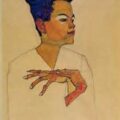Nothing Outside the Jouissance: On Alfie Bown’s “Enjoying It: Candy Crush and Capitalism”

Aristotle gave an early definition of pleasure, which lasted through the centuries, but later the psychoanalyst Jacques Lacan twisted this pleasure into enjoyment (jouissance), the positive dimensions of which can nonetheless pull people toward intense suffering, as well as ecstasy, both of which—as he discovered by putting the Marquis de Sade with Immanuel Kant—are in a certain sense enjoyable. It is not, however, Alfie Bown’s project in Enjoying It: Candy Crush and Capitalism to define enjoyment. Instead he traverses its fantasy, investigating the very enjoyment(s) by which we define ourselves.
As a caveat to this critical exploration of his new book, the analogy of a rock group may (as well) serve. Bown and I are connected through Everyday Analysis, a collective entity not dissimilar to a band. With a long list of members and collaborators, Everyday Analysis has produced a longstanding and well-received theory-and-the-everyday/popular-culture blog as well as two books of collected articles, the second of which—with its slightly more experimental forays in terms of running-order, length, artwork, and occasional noodling—might garner comparison to the stock music term “difficult second album,” while the third book (a tighter concept album) on politics is due out in October.
Meanwhile, that unpredictable beast known as the side-project (something close to the original project, but with a split) has arisen. For me, the experience of reading Enjoying It is akin to listening to a bandmate’s solo record: hearing in it the odd homage to or direct sample from the group, or the influence of the conjoined music on the separate style, and… enjoying it—thinking here: “that melody works well there,” and there, “I wish I’d written that line,” etc.
That is the perspective the current review is written from.

Enjoying It: Candy Crush and Capitalism
by Alfie Bown
Softcover, $11.99
Zero Books, 2015
If writing is a form of enjoyment, it is precisely the position(s) from which it enjoys that Bown is investigating in this book—not least in references to his own enjoyments throughout. Indeed, its first words are: “I am really enjoying this: the process of writing.” But even before these inaugural words—in the work’s very title (which must be read in its doubleness)—that positionality emerges as a fundamental concept of enjoyment. As well as referring to whatever it is that we enjoy in the process of doing so, it also construes us as subjects of and to enjoyment itself, and refers to how we are—or, at least, part of us is—an enjoying “it” (that is, as “id,” “ça,” “das Es,” in the psychoanalytic terminology).
To slightly contort the French philosopher Jacques Derrida: nothing, then, for Bown, is outside enjoyment. This isn’t just a cheap, enjoyable pun. When Derrida expanded on his infamous phrase, “there is nothing outside of the text,” in his altercation with John Searle, he reformulated it: “there is nothing outside of context.” The contextuality of enjoyment—that is, that which constitutively contextualises—is given grounds here to seem as all-encompassing as the above statement would suggest. It is the articulation of this tout court encompassment of enjoyment and the modifications of its perenniality under the present conditions of capitalism that Bown draws out, concluding with a note on the cynical turn towards the statist and regulative notion of happiness science—which Bown defines as “research” that “a culture that thinks of itself as progressive has latched onto [and] which aims to ‘promote happiness’ as a means of stipulating precisely what to enjoy.”
He demonstrates this subjective capitalisation not only through astute readings of the way enjoyment of games like Candy Crush Saga and Football Manager create versions of capitalist subjectivity, but also through the work of previous theorists of enjoyment and the capitalist condition (to whom he dedicates whole mini-chapters), such as Pierre Bourdieu, Jean-François Lyotard, and Gilles Deleuze and Félix Guattari, all the while keen to the very enjoyments involved in reading and engaging with them themselves—that is, just as for Derrida, we must critique, but cannot escape, logocentrism, for Bown, enjoyocentrism is just as ineluctable and imperative!
When he gets down to the key issues of capitalist subjectivity today, and elucidates them through their thinkers, he is at his best. The book only really falls short in its length. But, in being so short, it taps directly into that moreishness that enjoyment always entails. Much more work can be done on its subject; as a jumping-off point, it provides a very bouncy foundation.
On ideology, Bown reads enjoyment through Bourdieu: “our enjoyment of culture works by making us forget that we have acquired it. In this way, enjoyment is the key to ideology, making socialized things feel natural.” On desire, he explains—via Deleuze and Guattari—that “whilst desire exists outside of capitalism, it is not a desire for something until cultural factors and discourses map and channel desire into articulable and organized directions, turning unregulated desire into desire that serves the purposes of capital by directing it towards an object, making us desire things.”
The scepticism Bown deploys towards reading-enjoyment and its capitalist potentialities is at its acutest in his discussion of the …and Philosophy series of books (that is, as a particular brand and a general vogue). The trendification—modulating “commodification” to fit the terminology of our moment—of Deleuze and Guattari, for example, is always possible. Žižek has forewarned of the consequences of the yuppie reading their What is Philosophy? on the subway in a postmodern vein, perhaps paving a way to the hyperreal and unhinged desires of people like Martin Shkreli.
The simplicity of the cash-in series of books is a cynical and dilutory capitalist emergence in the realm of “smart thinking,” as Waterstone’s now dilute it. What Bown exposes is how—in the terminology of critical theology—these texts partake of the processes of eisegesis and prooftexting: the reading into texts of what one wants to find there (eisegesis), often through decontextualisation (prooftexting), a simple and lazy procedure that elides any work (or working-through, as psychoanalysis would say) or thought. Bown clearly sums it up:
[the] philosophy demonstrated by Game of Thrones and Philosophy, a 300-page book which across no less than twenty articles applying theory and philosophy to the show, unsurprisingly makes not one reference to psychoanalysis. This type of reading, if we are to employ [Jean-Claude] Milner’s terms, is lacking in thought; it provides nothing new, nothing changing, but simply forces new texts and new moments into the structures that already exist in our language.Whilst Game of Thrones and Philosophy perhaps should not necessitate reference to psychoanalysis to enable it to “think,” or be thoughtful—for philosophy itself is a thought-invoking practice when practiced properly—its analysis here is spot-on. Exposing its cynical eisegesis, Bown shows how this current is as alive in the academia as it is in this ostensible mainstreamisation of philosophy. It is hard to imagine the kid who says, ”I would never have read Hobbes in a million years, but I love Game of Thrones; now that those two things have been said in the same sentence, I’m a convert!.” As Bown puts it, this trend “aligns perfectly with the university discourse and its operation to pull enjoyment onto the side of already-accepted notions.”
It is from this camouflage that the superegoic injunction “learn and enjoy”—as Ian Parker has phrased it in his Psychoanalytic Mythologies—is revealed. Thus it is that we must take the author’s advice, as he discusses production—on which he is an emerging theoretical voice to watch (or rather listen) out for—of capitalist subjectivity through enjoyment, and be wary of enjoyocentrism: “the text ought always to be [read] against the grain of its enjoyment, our own enjoyment often showing not our resistance to the structures of our capitalist society but our complicity within it. The enjoyment therefore is productive of capitalist subjectivity.”
About Daniel Bristow
Daniel Bristow is a writer and academic living in Wiltshire in the United Kingdom. He co-runs Everyday Analysis and has published widely on a variety of subjects. His book, Joyce and Lacan: Reading, Writing, and Psychoanalysis, is due to come out on in August 2016 from Routledge. He has forthcoming articles on Dublin and Lisbon in The Palgrave Handbook of Literature and the City, planned for release in early 2017.





